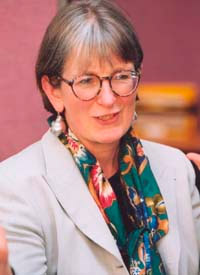What is changing?
Scientific developments – addressing climate change, applications of biotechnology, the use of stem cells or GM crops – are becoming ever more central to our national economies. Managing the public debate effectively is therefore critical to future scientific and economic success. However, recent research and other developments may combine to make public debate more difficult.
The power of values
A new piece of research published in Nature, by researchers from the Yale Law School’s Cultural Cognition Project, has established that values rather than numeracy or levels of education may be significant in defining perceptions of risk on major scientific issues such as climate change. In short, people whose values are more individualistic and prefer more hierarchical social structures tended to see climate change as less of a risk as their scientific literacy and numeracy increased. On the other hand, people whose values tended towards more communal values and egalitarian social structures tended to perceive climate change as a greater risk as they increased scientific knowledge. The result is that people may filter additional knowledge to reinforce existing views to a far greater extent than previously thought, and also in order to conform with their respective peer groups – who are likely to have similar values and ideas.
Anti-science growing?
In the UK and Australia there are growing concerns about an entrenched bias against science and for the arts among the establishment – especially in the media and in some universities. As a result, science does not get as much coverage as it might, given its growing significance in our societies and economies. However, science celebrities, such as Prof Brian Cox in the UK, are waging one man campaigns to counter that.
Rules about balance in the media and the desire for ‘lively debates’ also ensure that minority views on scientific issues often get as much airtime in programmes as mainstream well-researched, evidence based arguments.
But science is also under direct attack, with protesters using ever stronger rhetoric and scare tactics to get their message across. They are now also resorting to violence – even shooting at or sending letter bombs to scientists in Italy – and forming collaborative networks with likeminded groups worldwide.
Twitter dynamics
Research into traffic on Twitter has revealed that evangelical Christians have significantly greater responses – by a factor of 30 – than celebrities or CEOs. The likelihood of re-tweeting a message and the percentage of followers doing so were both significantly enhanced. Twitter is now actively recruiting among the Christian community.
Why is this important?
Religious groups are at the forefront of some of the challenges to modern science such as creationism versus evolution or resistance to research into stem cells. These two items of research would indicate therefore that groups with strong value sets such as religious groups are likely not only to have more entrenched views but also potentially to be more likely actively to respond to and share those ideas more widely.
Evidence will not necessarily win over rhetoric and emotion. Managing the emotional debate and targeting different arguments and policy interventions more clearly at different groups will be ever more significant in future policy development and industry decision making around science and science based industries or interventions.
By Sheila Moorcroft
About the author
 Sheila has over 20 years experience helping clients capitalise on change – identifying changes in their business environment, assessing the implications and responding effectively to them. As Research Director at Shaping Tomorrow she has completed many futures projects on topics as diverse as health care, telecommunications, innovation management, and premium products for clients in the public and private sectors. Sheila also writes a weekly Trend Alert to highlight changes that might affect a wide range of organisations. www.ShapingTomorrow.com
Sheila has over 20 years experience helping clients capitalise on change – identifying changes in their business environment, assessing the implications and responding effectively to them. As Research Director at Shaping Tomorrow she has completed many futures projects on topics as diverse as health care, telecommunications, innovation management, and premium products for clients in the public and private sectors. Sheila also writes a weekly Trend Alert to highlight changes that might affect a wide range of organisations. www.ShapingTomorrow.com







